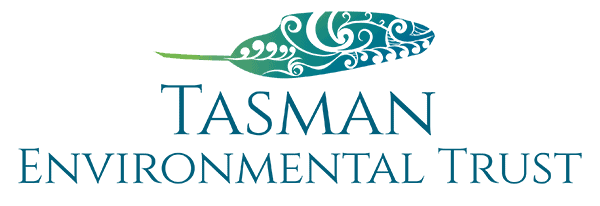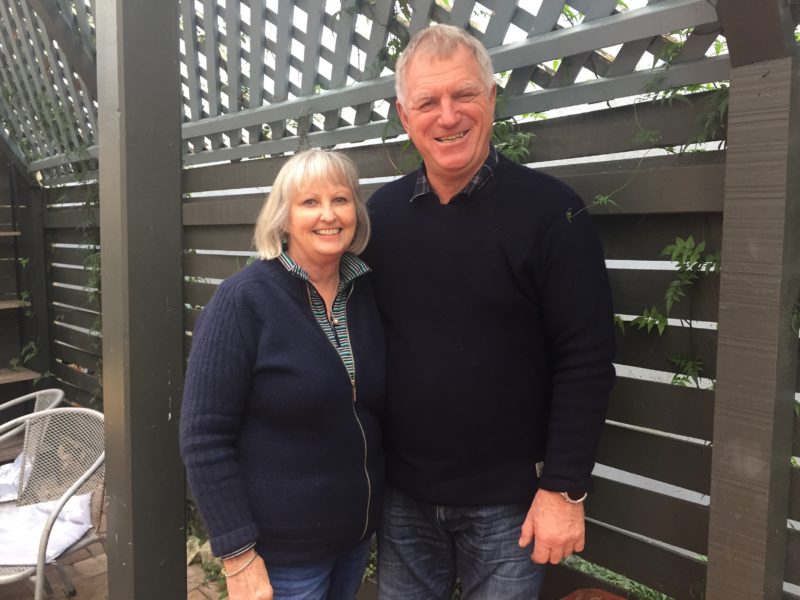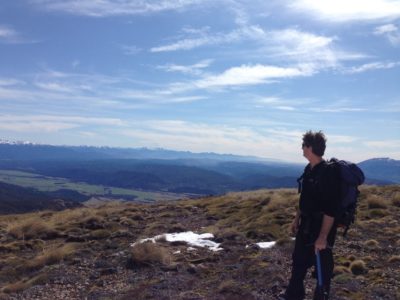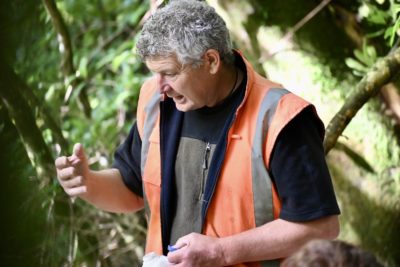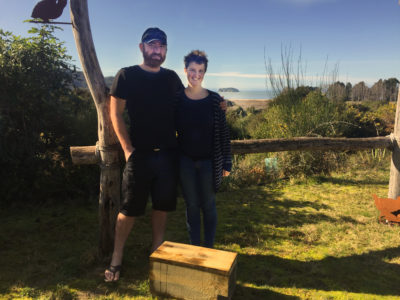Former Tasman Environmental Trust (TET) board member Gavin O’Donnell is now in the process of a lifestyle change. Having been in farming and agriculture all his working life, Gavin and his wife Sue are now living on a section in Havelock, and reorganising their lives for retirement.
“It’s a life transition,” Gavin says, “Something that we have known for a little while that was going to be on the cards … and it’s a little more complex than what I’ve dealt with before.”
For the last 20 years, Gavin has managed a large sheep and cattle property at Little Pokororo in Motueka Valley. When the property was sold in February this year, Gavin and Sue took the opportunity to ‘downsize’ and made the move to Havelock, Marlborough:
“Primarily, we simply like the place. It’s always going to be a small country town, and it’s almost midway between where our two sons and their families live, one in Nelson and one in Blenheim. And secondly, it’s better to make a clean break and a fresh start somewhere new.”
A voice for farmers on TET’s board
Gavin has served on TET’s board since 2012 as the Nelson Federated Farmers Trustee representative. Through his involvement with Federation Farmers, Gavin had developed an interest in environmental issues. He took up the board position because he considered it was important that the farmer voice was heard within the Trust.
Over his ten years on the board, Gavin says he has seen considerable growth in the capacity of TET.
“From the small beginnings of managing the Cobb Mitigation Fund for environmental work, primarily within the Takaka area, TET is now a significant player in the environmental space for the Nelson Tasman region,” he says.
“TET has certainly grown at an extremely fast pace particularly over the last five years, assisted in no small way by government policy and a new focus on environmental enhancement programmes … and it has developed into a community environmental hub that supports a large number of other groups. … ”
Balancing conservation and farm economics
In terms of conservation and rural land management, Gavin considers it “absolutely” important to bring the two together. He finds the real challenge is keeping farm businesses alive, financially viable and environmentally sustainable: “… and we need to find ways to ensure that happens.”
One of his concerns is that while there has been a lot of emphasis on riparian planting, other plantings and fencing, there has been little recognition of, or assistance for landowners, for the long-term maintenance and care of those planted areas.
“As a farmer, I’m really aware of the costs over the lifetime of a project which is the really expensive part, not just financial but physical as well. …The long-term success of any of these initial projects will depend entirely on the ability for those projects to be maintained or sustained over the long term.”
During the lifetime of a project, there is also the complexity of land changing ownership.
“There’s always a risk that some of those projects won’t be continued or maintained if successors or new owners don’t share the same vision, passion and values as the person who initiated those projects,” Gavin says.
He considers that weed and pest invasion, and flood damage, are bigger risks to a project’s success.
“One of the concerns I still have is that sometimes people don’t fully recognise the tension between riparian planting and maintaining flood capacity…
“Over time, if waterways become restricted by the riparian plantings that have taken place, and in times of heavy rainfall or flooding events those waters get pushed over the more productive land outside those riparian areas, I can imagine that, at some point … landowners may just get sick of that and get in there and open up the waterways again.”
Getting climate change buy-in
With extreme weather events occurring more frequently, Gavin doesn’t think there’s anything new about climate change:
“As a farmer I’ve spent a lifetime dealing with climate change; land users deal with climate on a day-to-day basis. It’s just the intensity and repetitive timeframe which is changing. As land managers it’s just something you need to factor in. …“
For those who have been in the agricultural industry for a considerable time, change isn’t always easy to grasp or implement. During his farming career, Gavin has noticed that when it comes to environmental needs and regulations, a financial incentive can be the prime motivator:
“… You can talk to people until you’re blue in the face but, frequently, it’s not until you start to extract some money out of people’s pockets that you get their undivided attention.”
“People are starting to become aware of the costs of non-compliance, and the financial benefits of compliance,” Gavin says. “That’s what is starting to drive people’s interest in figuring out how they can be part of the change.”
Gearing up for the next chapter
Having been a founding and active member of Tasman Rural Advisory Group for emergency management, and a volunteer firefighter with FENZ, Gavin expects he will continue to be involved. However, for the moment, he has pulled back a little while he and Sue get themselves unpacked and reset:
“I’m taking a pause to gather my breath and then I’ll reassess. I want to retain the flexibility to come and go. …”
Part of Sue and Gavin’s retirement and downsizing plan is that they have a big caravan in which they are planning to ‘come and go’ around the country. As Gavin says:
“During my farming career I’ve always been too busy and there are lots of places I haven’t been and lots of places I have been and want to go back to.”
Gavin and Sue still have lots to do in terms of collecting and relocating various items from the Little Pokororo farm, getting themselves settled in Havelock, and ‘finding their feet’ in a new town.
“Getting from point a to point b is never a straight line … there are twists and turns along the journey but it’s a matter of staying part of the journey. That’s the important thing.”
